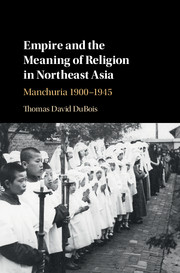
- Cited by 5
-
Cited byCrossref Citations
This Book has been cited by the following publications. This list is generated based on data provided by Crossref.
DuBois, Thomas 2018. Religious Freedom in East Asia: Historical Norms and the Limits of Advocacy. SSRN Electronic Journal,
DuBois, Thomas David 2018. Religious freedom in East Asia: historical norms and the limits of advocacy. Journal of Religious and Political Practice, Vol. 4, Issue. 1, p. 46.
L’Hérisson, Édouard 2022. « Dix mille courants, une seule racine ». Extrême-Orient, Extrême-Occident, Vol. 45, Issue. , p. 147.
Laliberté, André 2022. Chinese Religions and Welfare Regimes Beyond the PRC. p. 107.
Xiao, Jingjia Zhang, Shiyi and Wang, Xing 2024. The “war of position” in memory: the “Siden Saman” and the revivification of Manchu shamanism in northeastern China. Asian Anthropology, Vol. 23, Issue. 2, p. 73.
- Publisher:
- Cambridge University Press
- Online publication date:
- February 2017
- Print publication year:
- 2016
- Online ISBN:
- 9781316711026


